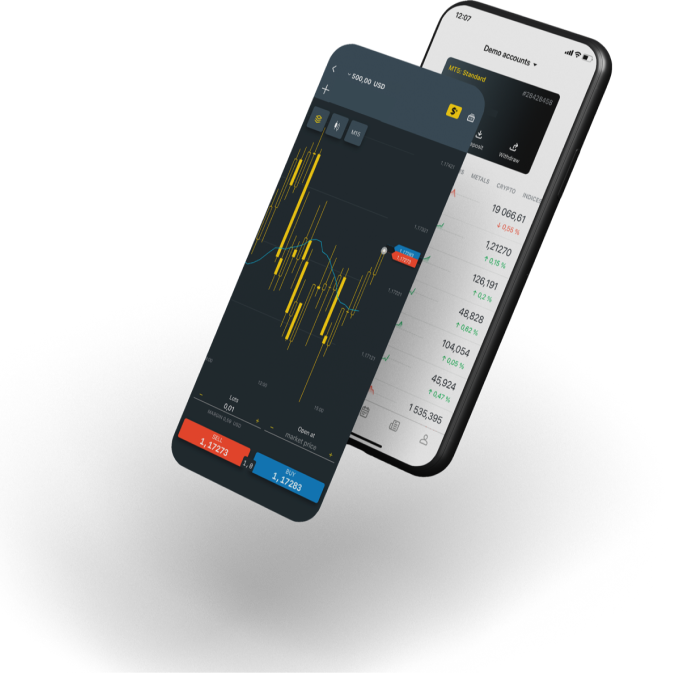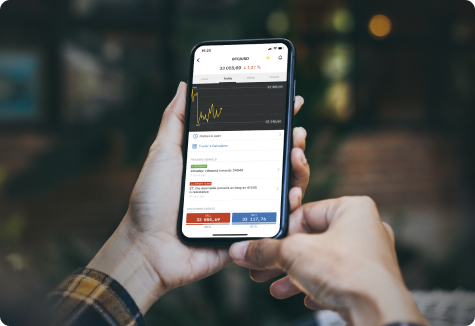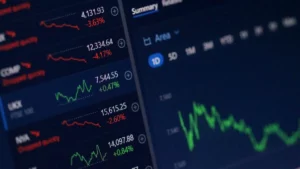Trusted trading platforms in Indonesia combine transparency, regulation, and consistent performance. A reputable provider should hold a valid BAPPEBTI license or an equivalent international authorization from FCA, ASIC, or CySEC. These licenses guarantee compliance with global financial standards and help protect client funds through segregated accounts. A platform must also offer stable execution, data encryption, and local payment support for Indonesian traders. Many users prefer brokers with responsive customer service in Bahasa Indonesia, clear fee structures, and access to reliable analytical tools. Ultimately, a trusted platform is defined by accountability, verified oversight, and reliable market access under regulated conditions.
Overview of Online Trading in Indonesia
Online trading in Indonesia has developed rapidly over the past decade, supported by improved internet access, the growth of fintech, and a growing middle class interested in financial independence. Today, thousands of Indonesians trade in forex, commodities, and stocks through licensed domestic and international platforms.
The main regulatory authority overseeing trading activities is BAPPEBTI (Badan Pengawas Perdagangan Berjangka Komoditi). This agency ensures brokers operating within Indonesia follow strict standards regarding transparency, fund segregation, and client protection. Traders can check a broker’s license status directly through the BAPPEBTI database, which helps reduce fraud and unauthorized activities.
Many international brokers have adapted their services to Indonesian market conditions, offering accounts denominated in IDR, local payment methods, and support in Bahasa Indonesia. Meanwhile, local brokers are strengthening their technology and liquidity partnerships to remain competitive against global providers.
The Indonesian trading landscape is characterized by three main categories:
- Local regulated brokers under BAPPEBTI supervision.
- International brokers with global licenses (FCA, CySEC, ASIC) who accept Indonesian clients.
- Hybrid options, where local agents represent offshore brokers, providing localized customer service and payment processing.
Each option offers specific advantages regarding accessibility, platform features, and support availability.

Key Features of a Reliable Trading Platform
Selecting a trading platform requires careful evaluation of its technical, financial, and regulatory characteristics. A reliable platform should offer secure fund handling, consistent order execution, and a transparent fee structure. Traders in Indonesia often consider several elements before opening an account.
Security Standards and License Verification
Security is the most critical factor in platform selection. A trusted provider must use SSL encryption, two-factor authentication (2FA), and segregated client accounts. These measures protect user credentials and prevent unauthorized fund transfers.
Regulation remains the foundation of platform trustworthiness. Brokers operating locally must hold a BAPPEBTI license, while international platforms should be authorized by global bodies such as:
- Financial Conduct Authority (FCA, UK)
- Australian Securities and Investments Commission (ASIC)
- Cyprus Securities and Exchange Commission (CySEC)
To verify a license, traders can check:
- The regulator’s official website using the broker’s registration number.
- The broker’s legal entity name, ensuring it matches the one listed under regulation.
- Public warnings or disciplinary records available through the regulatory portals.
Below is a table summarizing key licensing bodies relevant to Indonesian traders:
| Regulator | Region | Website Verification Link |
| BAPPEBTI | Indonesia | bappebti.go.id |
| FCA | United Kingdom | register.fca.org.uk |
| ASIC | Australia | asic.gov.au |
| CySEC | Cyprus | cysec.gov.cy |
In addition to compliance, platform reliability depends on execution speed, server stability, and order accuracy. Even minor slippage can influence profitability for active traders. Therefore, most professionals prefer brokers connected to Tier-1 liquidity providers with low-latency infrastructure.
Popular Trading Platforms Used in Indonesia
Indonesia’s traders have access to multiple trading systems, from proprietary web terminals to well-known software like MetaTrader 4 (MT4), MetaTrader 5 (MT5), and cTrader. The choice depends on trading strategy, automation needs, and broker availability.

Local Brokers Registered with BAPPEBTI
Local firms regulated by BAPPEBTI typically specialize in forex and commodity trading. They comply with local deposit rules, tax obligations, and capital adequacy requirements. Examples include PT Monex Investindo Futures, PT Asia Trade Point Futures, and PT Valbury Asia Futures.
These companies offer advantages such as:
- Accounts denominated in Indonesian Rupiah (IDR).
- Local bank transfers through BCA, Mandiri, or BNI.
- Compliance with national trading regulations and investor protection frameworks.
However, trading conditions may differ from global brokers due to limited liquidity access and smaller product ranges.
International Brokers Accepting Indonesian Clients
International providers attract many Indonesian traders due to broader market coverage and advanced technology. They usually offer tighter spreads, higher leverage options, and access to global assets like indices, metals, and CFDs.
Traders can verify an international broker’s credibility through:
- License verification from FCA, ASIC, or CySEC.
- Transparency in transaction costs, clearly stated on their websites.
- Availability of local payment solutions like Fasapay, Skrill, and bank wire in IDR.
Account Types and Deposit Options
Brokers serving Indonesian traders usually offer several account formats designed for different trading volumes and strategies. Understanding these structures helps select a suitable environment for cost management and execution style.
Standard vs. ECN Accounts Explained
Trading accounts fall into two main categories — Standard and ECN (Electronic Communication Network).
Standard accounts are more accessible for beginners. They often feature fixed or slightly variable spreads without direct market access. Execution occurs through the broker’s internal dealing desk, meaning orders may be matched internally before reaching the market. These accounts usually require a smaller initial deposit, typically starting from USD 10–50, making them appealing for smaller portfolios.
ECN accounts, on the other hand, provide direct access to liquidity providers. Orders are executed at market prices with variable spreads that can reach near-zero under certain conditions. Traders pay a fixed commission per lot instead. This structure suits scalpers and high-frequency strategies, where precision and order speed matter more than fixed spreads.
| Account Type | Execution Model | Spread Type | Typical Deposit | Ideal For |
| Standard | Dealing Desk | Fixed or Variable | $10–$50 | New traders or swing traders |
| ECN | Direct Market Access | Floating (from 0.0 pips) | $100–$500 | Scalpers, algorithmic traders |
When selecting between them, traders should consider trade volume, preferred instruments, and transaction cost sensitivity. Both account types can operate on platforms like MT4, MT5, or cTrader, depending on broker integration.
Deposit and Withdrawal Methods in Indonesia
Reliable brokers offer flexible funding methods suitable for local users. Payment systems must comply with both banking standards and anti-money laundering (AML) policies.
In Indonesia, common deposit channels include:
- Local bank transfers via BCA, BNI, Mandiri, and CIMB Niaga.
- E-wallets such as Fasapay, OVO, and DANA.
- Global payment processors like Skrill, Neteller, and Visa/Mastercard.
Withdrawals usually follow the same route as deposits to maintain transparency.
Processing time can vary — local bank transactions often clear within 1–2 business days, while international e-wallets may settle instantly.
Below is a summary of typical options:
| Payment Method | Processing Time | Availability | Currency Support |
| Bank Transfer | 1–2 business days | Nationwide | IDR, USD |
| E-Wallets (Fasapay, OVO, DANA) | Instant–24 hours | High | IDR |
| Skrill / Neteller | Instant–12 hours | Moderate | USD, EUR |
| Credit/Debit Cards | 1–3 business days | Global | USD, EUR |
Many traders prefer using IDR-based wallets for convenience, avoiding conversion fees. To protect capital, withdrawal requests should always be confirmed through the trader’s personal area using secure authentication.
Mobile and Web-Based Trading Solutions
Access flexibility is a defining feature of modern trading platforms. Mobile and web terminals enable real-time monitoring without constant access to desktop software. For Indonesian traders who often trade during market overlaps with Asia and Europe, this mobility is crucial.
Mobile Terminals
Most leading brokers offer mobile applications on iOS and Android. These apps allow full account management, order placement, and chart analysis. The main advantages include:
- Quick trade execution even with 4G or 5G connections.
- Push notifications for market events or margin alerts.
- Simplified interfaces for order management.
Mobile platforms often mirror desktop versions, integrating technical indicators such as Moving Averages, RSI, and Bollinger Bands. However, limited screen space means advanced backtesting or EA (Expert Advisor) installation is usually restricted to desktop setups.
Web-Based Platforms
Web traders are browser-accessible terminals that require no installation. They function across operating systems, making them suitable for users on shared or restricted devices.
For Indonesian users, a strong internet connection is enough to manage open positions, analyze charts, and review trade history securely. Many brokers encrypt browser sessions through HTTPS and enable 2FA verification, reducing cyber risks.
Key differences between mobile and web trading:
| Feature | Mobile App | Web Terminal |
| Accessibility | iOS / Android | Any browser |
| Speed | Fast for quick orders | Moderate, depends on internet |
| Charting Tools | Basic to intermediate | Full-featured |
| Custom Indicators | Limited | Supported |
| Ideal Use | On-the-go monitoring | Full analysis and trading |
Many traders combine both, opening positions from their desktops and tracking or closing them from their phones.
Educational Resources and Market Analysis Tools
Effective trading depends on more than execution. Knowledge, consistent analysis, and emotional control shape long-term outcomes. Trusted brokers recognize this by offering structured educational materials and integrated research instruments.
Learning Materials for Beginner Traders
Educational content often includes structured tutorials, webinars, and market guides designed to introduce essential trading principles. Indonesian brokers frequently offer localized versions in Bahasa Indonesia, helping new traders understand:
- The mechanics of currency pairs and CFD contracts.
- Order types such as market, limit, and stop.
- Risk management principles like setting stop-loss and take-profit levels.
Short-term demo challenges or micro-accounts also help beginners gain practical experience without high exposure.
Integrated Charts and Indicators
Most trading terminals — especially MT4 and MT5 — provide a full suite of technical indicators. These range from moving averages to Fibonacci retracements. Some brokers expand the standard toolset by integrating TradingView or Autochartist for pattern recognition.
Key analysis features commonly available:
- Multiple timeframe charts from 1-minute to monthly.
- Custom indicator scripting with MQL4/MQL5 languages.
- Strategy testing for algorithmic models.
These tools allow traders to refine entry points and monitor price behavior with precision.
Risk Management and Trading Psychology
Even with accurate analysis, poor discipline can destroy profitability. Platforms that include built-in risk calculators, margin alerts, and daily P/L summaries help maintain consistent decision-making.
To handle emotional pressure, educational modules on trading psychology are also valuable. Topics often cover:
- How to manage overtrading impulses.
- The importance of maintaining trade journals.
- Methods for setting realistic daily targets.
By combining education with platform analytics, traders can create structured workflows and reduce common behavioral errors.
Evaluating Customer Support and Local Services
Service quality matters once real money is on the line. Fast answers during a margin call, a stuck withdrawal, or a platform outage can decide P/L. The best option for Indonesia pairs strong multilingual assistance with clear escalation paths and visible service-level metrics.
A solid check starts with channel coverage. Live chat should be staffed during Asian and European sessions. Email tickets need an ID and a timestamp. Phone lines must publish Jakarta time hours. Response targets should be public: first reply under 2–5 minutes on chat, under 24 hours for email, and immediate pickup or rapid callback for phone. Anything slower hints at thin staffing.
Next, examine the competence of the front line. Agents should understand order types, margin math, swap calculations, chart settings, and common platform errors. If the first interaction ends with generic scripts or links, the desk likely lacks training. A quick probe helps: ask the agent to calculate margin for 1 lot EURUSD at 1:500 or to explain the difference between stop and stop-limit. Quality teams answer without hesitation.
Turnaround on operational tasks also matters. Account verification within one business day, funding reconciliation within the promised window, and proactive updates during incidents mark mature processes. Incident pages or status dashboards add extra clarity during outages.
Indonesian Language Assistance and Response Times
Bahasa Indonesia availability cuts friction for newcomers and helps during stressful moments. Many desks switch between Bahasa and English; both should be fluent enough for technical chat. Ideal targets:
- Live chat first reply: 2–5 minutes during local business hours.
- Phone queue: under 60 seconds.
- Email resolution: within 24 hours for simple cases, 48–72 hours for escalations.
If a desk quotes these numbers and meets them consistently, retention usually follows.
Availability of Local Offices or Representatives
A Jakarta office or authorized representative signals long-term commitment. Onsite presence often speeds up KYC review, bank liaison, and compliance checks. It also helps during disputes that require document handling. Where a full office is absent, check for verified local partners or regular roadshows with published schedules.
Community Support and User Feedback
Forums, Telegram groups, and independent review hubs give early warnings. Look for consistent comments on withdrawal timing, slippage during high-impact releases, and swap discrepancies. A healthy community features active moderators, Indonesian threads, and real trade screenshots rather than marketing posts. Pattern recognition is key: one bad story means little; repeated themes signal risk.
Choosing the Right Trading Platform for Your Needs
Selection should map to objectives, capital size, and execution style. A swing trader holding positions for days cares about swap rates, rollover handling, and stable chart data. A scalper cares about raw spreads, tick quality, and order routing speed. A copy-trading user prioritizes strategy discovery, leader transparency, and follower protections like equity stop.
A practical decision path:
- Define the instrument set. Spot FX only, or also indices, metals, energies, equities, crypto-CFDs? Narrow the list to brokers that list the exact symbols needed with stable liquidity during Asian hours.
- Match the account model. Standard for small, infrequent orders; ECN for tight spreads and high turnover. Confirm commission per lot, average spread during Asian session, and typical slippage on news.
- Validate the stack. MT4/MT5 remain common for EAs; cTrader suits depth-of-market and fast entries; TradingView links help with charting. If automation matters, confirm VPS latency (<5–10 ms to the trade server) and allowed order frequency.
- Stress-test funding flows. Run a small round-trip: deposit via the planned method in IDR, place a tiny trade, then withdraw. Measure timestamps. Keep screenshots of every step.
- Check legal and operational facts. License verification, segregated accounts, negative balance protection policy, clear T&Cs on margin closeout (stop-out %), and documented corporate entity details.
- Measure service quality. Contact the desk with two or three technical questions. Ask for swap formulas, corporate action handling for index CFDs, and daylight-saving time adjustments on server clocks.
- Monitor risk controls. Confirm hard stop placement rules, guaranteed stops availability (if any), and maximum exposure per symbol. For news trading, clarify restrictions on latency arbitrage or tick scalping.
If two candidates look equal, pick the one with a transparent status page and consistent public communications during incidents. Calm, precise updates beat marketing during drawdowns and outages.
Frequently Asked Questions
Is BAPPEBTI registration mandatory for Indonesia-based brokers?
Yes. Firms operating domestically must hold a BAPPEBTI license. International entities that accept Indonesian residents operate under their own regulators. Traders should verify the exact legal entity and license number before funding.


